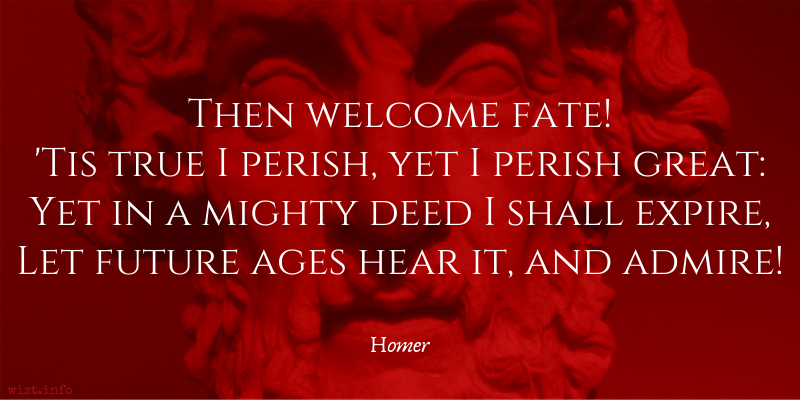If life is a play, then old age is its last act — and we ought to leave the theater when we are weary or, even better, when we are satisfied.
[Senectus autem aetatis est peractio tamquam fabulae, cuius defetigationem fugere debemus, praesertim adiuncta satietate.]Marcus Tullius Cicero (106-43 BC) Roman orator, statesman, philosopher
De Senectute [Cato Maior; On Old Age], ch. 23 / sec. 85 (23.85) (44 BC) [tr. Cobbold (2012)]
(Source)
(Source (Latin)). Alternate translations:
The poete whiche rehercith in the Scene in some fable owght to beware that he make not werye and that he noye not his heerers by ouer long rehercyng the fable. So that men owght not desire to lyve ouir olde age seeyng pryncypally that in that age or nevir he is fulle weerye for to lyve.
[tr. Worcester/Worcester/Scrope (1481)]
And old age is, as it were, the peroration or final end of a man's time in this world, much like to the epilogue or catastrophe of an interlude, the wearisome repetition or defatigation whereof we ought to avoid and eschew, and especially when we are fully cloyed with satiety.
[tr. Newton (1569)]
But old age is the last act of our life as of a play, of which there ought to be an end, especially when there is satiety and fulnesse of time joyned with it.
[tr. Austin (1648)]
Good Acts (if long) seem tedious, so is Age
Acting too long upon this Earth her Stage.
[tr. Denham (1669)]
For in Old Age we are as in the last Act of a Play, in which we ought to take our Leave when fully satisfied with the Enjoyment.
[tr. J. D. (1744)]
And as the whole Course of Life but too much resembles a Farce, of which Old-Age is the last Act; when we have enough of it, 'tis most prudent to retire, and not to make a Fatigue of what we should endeavour to make only an Entertainment.
[tr. Logan (1744)]
In fine, old age may be considered as the last scene in the great drama of life, and one would not, surely, wish to lengthen out his part till he sunk down sated with repetition and exhausted with fatigue.
[tr. Melmoth (1773)]
Now old age is the completion of life, as of a play, weariness of which we ought to avoid, especially when satiety is added.
[Cornish Bros. ed. (1847)]
Now old age is the consummation of life, just as of a play; from the fatigue of which we ought to escape, especially when satiety is superadded.
[tr. Edmonds (1874)]
Old age is the closing act of life, as of a drama, and we ought in this to avoid utter weariness, especially if the act has been prolonged beyond its due length.
[tr. Peabody (1884)]
Now, old age is as it were the playing out of the drama, the full fatigue of which we should shun, especially when we also feel that we have had more than enough of it.
[tr. Shuckburgh (1895)]
Age; is; the end; of life, as of a play:
We should avoid the weariness that comes,
The more, if we've enjoyed it to the full.
[tr. Allison (1916)]
Moreover, old age is the final scene, as it were, in life's drama, from which we ought to escape when it grows wearisome and, certainly, when we have had our fill.
[tr. Falconer (1923)]
When life's last act, old age, has become wearisome, when we have had enough, the time has come to go.
[tr. Grant (1960, 1971 ed.)]
Yes, old age is, so to speak, the last scene in the play; when we find it beginning to be tiresome we should beat a hasty retreat from it, especially when we feel as if we had seen all this before, entirely too many times.
[tr. Copley (1967)]
Old age is the last act of the drama of life and when it is over we ought to leave it, especially if we have achieved a good fullness in it.
[tr. Gerberding (2014)]
Old age is but life’s drama’s final curtain.
[tr. Bozzi (2015)]
Old age is the final act in the play of life. When we have had enough and are weary, it is time to go.
[tr. Freeman (2016)]
Quotations about:
exit
Note not all quotations have been tagged, so Search may find additional quotes on this topic.
Then welcome fate!
‘Tis true I perish, yet I perish great:
Yet in a mighty deed I shall expire,
Let future ages hear it, and admire![νῦν αὖτέ με μοῖρα κιχάνει.
μὴ μὰν ἀσπουδί γε καὶ ἀκλειῶς ἀπολοίμην,
ἀλλὰ μέγα ῥέξας τι καὶ ἐσσομένοισι πυθέσθαι.]Homer (fl. 7th-8th C. BC) Greek author
The Iliad [Ἰλιάς], Book 22, l. 303ff (22.303) [Hector] (c. 750 BC) [tr. Pope (1715-20), l. 385ff]
(Source)
Original Greek. Alternate translations:
But Fate now conquers; I am hers; and yet not she shall share
In my renown; that life is left to every noble spirit,
And that some great deed shall beget that all lives shall inherit.
[tr. Chapman (1611), l. 266ff]
But I will not fall
Inglorious; I will act some great exploit
That shall be celebrated ages hence.
[tr. Cowper (1791), l. 347ff]
Fate overtakes me. Nevertheless I will not perish cowardly and ingloriously at least, but having done some great deed to be heard of even by posterity.
[tr. Buckley (1860)]
My fate hath found me now.
Yet not without a struggle let me die,
Nor all inglorious; but let some great act,
Which future days may hear of, mark my fall.
[tr. Derby (1864)]
Now my fate hath found me. At least let me not die without a struggle or ingloriously, but in some great deed of arms whereof men yet to be born shall hear.
[tr. Leaf/Lang/Myers (1891)]
My doom has come upon me; let me not then die ingloriously and without a struggle, but let me first do some great thing that shall be told among men hereafter.
[tr. Butler (1898)]
Now again is my doom come upon me. Nay, but not without a struggle let me die, neither ingloriously, but in the working of some great deed for the hearing of men that are yet to be.
[tr. Murray (1924)]
But now my death is upon me. Let me at least not die without a struggle, inglorious, but do some big thing first, that men to come shall know of it.
[tr. Lattimore (1951)]
Now the appointed time's upon me. Still, I would not die without delivering a stroke, or die ingloriously, but in some action memorable to men in days to come.
[tr. Fitzgerald (1974)]
So now I meet my doom. Well let me die --
but not without struggle, not without glory, no,
in some great clash of arms that even men to come
will hear of down the years!
[tr. Fagles (1990), l. 359ff]
But now has my doom overcome me. But let me at least not die without making a fight, without glory, but a great deed having done for the men of the future to hear of.
[tr. Merrill (2007)]
May I not die without a fight and without glory
but after doing something big for men to come to learn about.
[tr. @Sentantiq (2011)]




